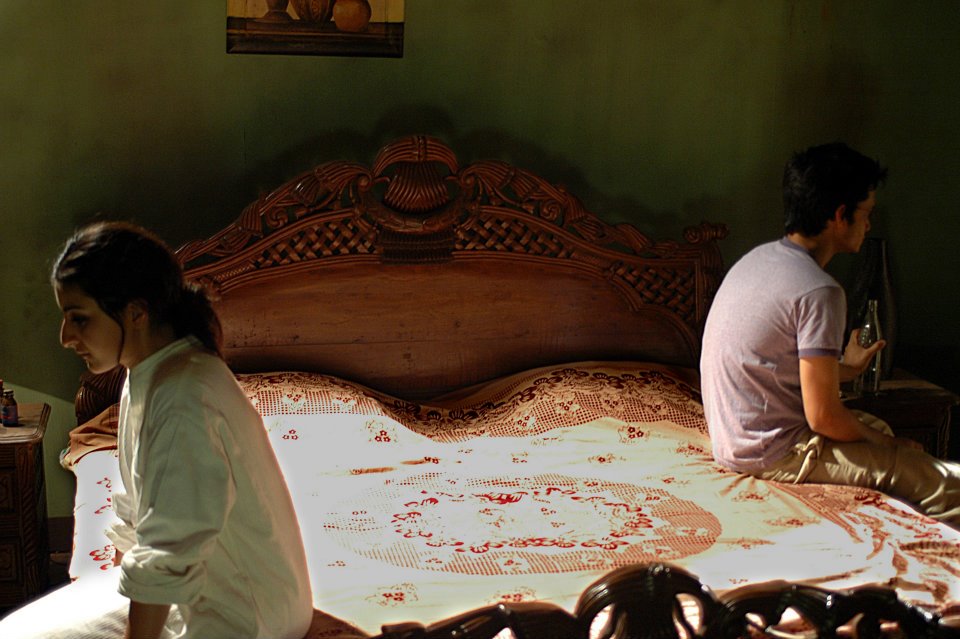This post first appeared on Totally Filmi on March 23, 2012.
Chaurahen (Crossroads) is, of course, Rajshree Ohja’s debut film, released only now, long after it was made and after the release of her second film, Aisha. It’s an ambitious film – perhaps too ambitious, but it’s difficult to fault Ohja for trying to juggle something very difficult and not quite succeeding. Here, she chooses to adapt several of Nimal Verma’s short stories. I’ll admit that I’ve only read a handful of Verma’s stories, not enough to adequately judge, perhaps; yet, I was left with the impression watching Chaurahen that Ohja managed to capture something of Verma’s universe. Perhaps not always, nor consistently, and that contributes, I suspect, to the feeling I have that Chaurahen is, as a whole, a difficult film to like.
So we have Farooq (Ankur Khanna), a young writer pinned like a butterfly in his parents’ house, which he desperately is trying to preserve to keep his memories of them alive, memories which are slowly suffocating him and destroying his relationship with his girlfriend, Ira (Soha Ali Khan). Then there’s Dr. and Mrs. Bose (Victor Banerjee and Roopa Ganguly), their marriage torn apart by the death of their daughter, leading her to suffer in silence while he carries on an affair with a young French girl (Kiera Chaplin, who does not seem to have inherited her famous grandfather’s acting genes); and there is the NRI writer Nandu (Karthik Kumar), home with his family after the recent death of his soldier brother, Keshi (Shayan Munshi), longing to step out from his brother’s shadow and live his own life, on his own terms. There is Keshi himself, seen in a flashback, who meets a woman (Zeenat Aman) in a bar the night before he is sent off to war. Families, relationships, sorrows, and the crossroads they lead to, all of which Ohja attempts to juggle and intertwine.
I rather like the idea of several stories of people at crossroads in their lives and their relationships, who finally find the courage or the serenity to accept what has happened to them and begin to move on, but I will admit that only one of the film’s tracks truly engaged me.
I understand that the sterility and oppressiveness I felt in the Farooq/Ira storyline was probably there to underscore what was happening in Farooq’s life, but I had very little patience with this track, and their constant philosophising ended up feeling rather pedantic and clichéd rather than something I was supposed to reflect on. And I understood the Keshi/mysterious woman segment too, but couldn’t help seeing it as something that took me out of the Nair family’s track, rather than illuminating it. The Dr. and Mrs Bose segment interested me somewhat, but mostly because I longed to know more about Mrs. Bose and her incredible sadness, and more about the death of their daughter, which seemed to have driven them apart.
Nonetheless, I found Chaurahen an intriguing film, if an uneven one. It shows the inexperience of the first-time director at times, and I was often left with impressions and not with emotions. That said, the film has moments that are breathtakingly painful and beautiful; for example, when Mrs. Bose goes to automatically put sindoor in her hair, and then stops herself. Your heart can’t help break for her in that moment.
Here’s where I have to make a confession: Ohja’s cast, including Victor Banerjee, Roopa Ganguly, Soha Ali Khan, Ankur Khanna, Shayan Munshi, Karthik Kumar, Arundathi Nag, Suchitra Pillai and Zeenat Aman is impressive. But if you put Malayalam veteran actor Nedumudi Venu in a film, there is no way I cannot help but love it – or, at least, the bits he’s in. So it’s no surprise then, than the story I found the most moving and most beautiful was that of the Nair family: father (Nedumudi Venu), mother (Arundathi Nag), sister (Suchitra Pillai) and son, Nandu (Tamil actor Karthik Kumar). Of all the stories, this one presented interesting and well-rounded characters, grieving for their son/brother, yet still capable of incredibly joyful moments, such as when they dance together at the instigation of the granddaughter.
There is much delicacy and subtlety in the dilemma facing Nandu, the NRI who has come home only because of his brother’s death. Nandu, like many of the film’s characters, is stuck at a crossroads, between his father’s expectations of him and the life he has made for himself in Vienna. “Secrets, they turn into an unbearable sadness, which we drown in, if we don’t let them go,” says Mrs. Bose, and this is certainly true of Nandu and the secret he hides, and, in one of the film’s finest and most touching scenes, which he eventually shares with his sister. Nandu must finally stand up to his father, who begrudges his wish to leave Kochi and return to Vienna; but instead of driving a wedge between them, it leads to greater acceptance of Nandu and his choices. Not surprising though – Ohja presented me with a family in which I was certain that the undercurrent of love and respect they felt for each other would trump any differences they might have.
Nandu’s story, and that of his family, was so deftly constructed and imbued with such grace that it left me breathless and teary. “Happiness does not exist. It is only remembered in times of sorrow,” wrote Farooq in one of his books. The Nair family proves, however, that although happiness is, indeed, remembered in times of sorrow, it is, also, the very thing that allows us to face our crossroads and make the choices we need to move on and leave sorrow behind.

